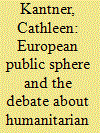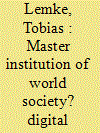| Srl | Item |
| 1 |
ID:
084823


|
|
|
|
|
| Publication |
2008.
|
| Summary/Abstract |
In recent years, there is growing interest in the study of cross-national policy convergence. Yet we still have a limited understanding of the phenomenon: Do we observe convergence of policies at all? Under which conditions can we expect that domestic policies converge or rather develop further apart? In this article, we address this research deficit. From a theoretical perspective, we concentrate on the explanatory power of three factors, namely international harmonization, transnational communication, and regulatory competition. In empirical terms, we analyze if and to what extent we can observe convergence of environmental policies across twenty-four industrialized countries between 1970 and 2000. We find an impressive degree of environmental policy convergence between the countries under investigation. This development is mainly caused by international harmonization and, to a considerable degree, also by transnational communication, whereas regulatory competition does not seem to play a role.
|
|
|
|
|
|
|
|
|
|
|
|
|
|
|
|
| 2 |
ID:
134064


|
|
|
|
|
| Publication |
2014.
|
| Summary/Abstract |
Studies on the democratic control and legitimacy of Common Security and Defence Policy (CSDP) have thus far mostly focused on formal institutions. However, a comprehensive analysis requires including the 'sociocultural infrastructure' in which such formal institutions are embedded. Students of democracy have argued that the public sphere is a crucial dimension, if not a precondition for all mechanisms of democratic control in general. This paper investigates whether and in which ways Europeans participated in transnational European communication on humanitarian military interventions (1990-2005/2006). The paper analyzes a full sample of 108,677 newspaper articles published in leading newspapers of six EU member states, and the US as a comparative case. It demonstrates that the 'national' arenas of political communication are intertwined and allow ordinary citizens to make up their minds about common European issues in the highly controversial and normatively sensitive realm of humanitarian military interventions.
|
|
|
|
|
|
|
|
|
|
|
|
|
|
|
|
| 3 |
ID:
161652


|
|
|
|
|
| Summary/Abstract |
In English School theory, the putative change from an international society of states to a world society of individuals is usually associated with the diffusion of a benign form of cosmopolitanism and the normative agenda of solidarism. Consequently, the notion that world society might enable alternative expressions of transnational politics, independent from international society, remains underdeveloped. Drawing on the literature of contentious politics and social movements, this article challenges orthodox accounts and suggests that the global proliferation of digitally mediated linkages between individuals and nonstate actors constitutes a fundamental challenge to traditional dynamics of interstate communication in the form of the diplomatic system. This provides an opportunity to reconceptualize world society as an alternative site of politics distinct from mainstream international society and generative of its own logic of communication, mobilization, and action. The 2011 events in Egypt and the ongoing digital presence of the so-called Islamic State are used to demonstrate how massive increases in global interaction capacity are transforming the pathways for political contention and collective mobilization worldwide.
|
|
|
|
|
|
|
|
|
|
|
|
|
|
|
|